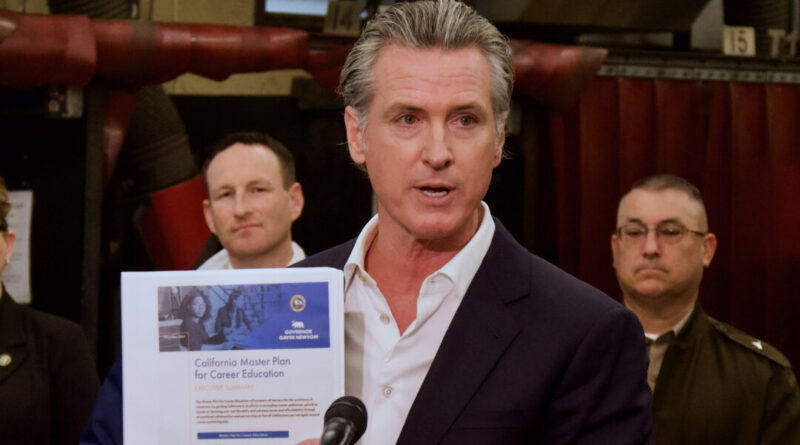California Strives to Facilitate Career Launch for Non-College Graduates
Veterans and active-duty military personnel will have the opportunity to earn college credits based on their training, with tracking facilitated through ‘career passports.’
REDDING, Calif.—On December 16, state officials unveiled multiple new workforce development initiatives, including “career passports” aimed at monitoring the skills Californians acquire through military service, volunteer work, or employment.
This learning and employment record is expected to assist employers in assessing candidates more effectively and finding appropriate hires, as noted by supporters like California Gov. Gavin Newsom, who introduced the initiative at a welding shop at Shasta College, located a few hours north of Sacramento.
The governor emphasized that the state is focused on directing individuals toward career opportunities that are accessible for those unable to pursue higher education due to financial constraints or capacity.
“We need to emphasize not just college but also career paths,” Newsom stated. “We must establish a system that allows individuals to reap the rewards of a fulfilling life that doesn’t necessarily rely on obtaining a prestigious degree.”
With the new strategy, veterans, active-duty military, and other workers will be able to convert their practical experiences into college credits available throughout the state, which is projected to benefit about 30,000 service members, according to the governor’s office.
Approximately 250,000 Californians will be eligible to utilize their experiences to minimize the credit hours required for graduation.
According to Newsom, these components of the state’s Master Plan for Career Education will emphasize leveraging life-acquired skills to facilitate college completion and professional advancement for individuals who currently lack degrees.
“We’re also creating avenues to cultivate skill sets in collaboration with our community colleges,” the governor noted.
Shasta College welding shop instructor Jay Davis mentioned that hundreds of students annually complete welding and machining programs, with many securing jobs that pay nearly $30 per hour.
Newly elected Republican Assemblywoman Heather Hadwick, an alumna of Shasta College and Chico State, expressed her appreciation for the state’s dedication to motivating young people to pursue fulfilling careers.
“It’s crucial to expose our youth to the opportunities available to them, especially when they may not see these prospects at home,” she stated during the press event. “I’m very enthusiastic about seeing this initiative put into action.”

Assemblywoman Heather Hadwick speaks at a press conference on career pathways at Shasta College in Redding, Calif., on Dec. 16, 2024. Travis Gillmore/The Epoch Times
Assembly Education Committee chair, Democratic Assemblyman Al Muratsuchi, stated that this initiative exemplifies the state’s commitment to enhancing the quality of life for all Californians.
“I want to make it crystal clear that Sacramento is invested in the North State,” Muratsuchi remarked, referencing the far northern counties that constitute one of the state’s 13 diverse economic regions.
He emphasized that the region faces distinct challenges that necessitate investing in youth to help “impart practical skills for the jobs of today and tomorrow.”
Stuart Knox, secretary of the state’s Labor and Workforce Development Agency, stated that the new “career passports” tool will simplify the connection between employers and potential employees.
“It’s not simply about what they’ve studied in college; it’s also about their on-the-job experiences,” Knox explained during the press briefing. “Having this record will facilitate the process for employers to locate the right candidates, and help future generations find suitable employment.”

Stuart Knox, secretary of California’s Labor and Workforce Development Agency, speaks at a press conference at Shasta College in Redding, Calif., on Dec. 16, 2024. Travis Gillmore/The Epoch Times
The governor’s target is to have 500,000 participants complete apprenticeships by 2029, following an investment of over $221 million in related initiatives during the previous fiscal year.
One local school administrator expressed optimism regarding the initiative, believing it will greatly assist the region through the career pathways programs.

Billy Miller, dean of extended education and North State Together at Shasta College, speaks at a press conference from the welding shop at the college in Redding, Calif., on Dec. 16, 2024. Travis Gillmore/The Epoch Times
“I believe that working together, we can navigate opportunities and address complex challenges to create a brighter future for our students,” Billy Miller, dean of extended education and North State Together at Shasta College, stated during the press conference.
The governor’s visit to Shasta County was part of his “Jobs First Tour,” which has seen him engage with communities in Fresno, Kern, and Colusa counties within the Central Valley in recent weeks.
Economic regions received $5 million each to formulate economic strategies, while each of the state’s 13 regions is crafting proposals that will contribute to a comprehensive statewide plan expected to be presented early next year, according to the governor’s office.
Additionally, each region obtained $14 million to initiate actions for specific projects, with $120 million in competitive grants scheduled for distribution in 2025, with applications opening on January 1.





